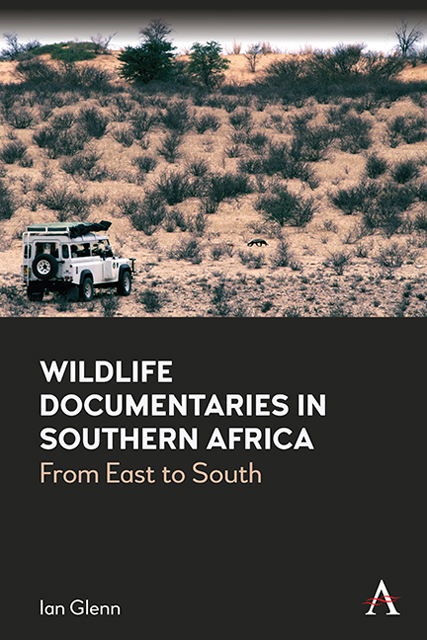Book contents
- Frontmatter
- Dedication
- Contents
- List of Figures
- Acknowledgements
- Introduction
- Chapter 1 What do the Critics Say?
- Chapter 2 A Theoretical Coalition?
- Chapter 3 Gone South: From East to Southern Africa
- Chapter 4 Private Lodges, Infrastructures and Guides
- Chapter 5 Going South: The Results
- Chapter 6 The Early History
- Chapter 7 The South Africans Enter the Game
- Chapter 8 Michael Rosenberg and Partridge Films
- Chapter 9 David and Carol Hughes
- Chapter 10 The Bartletts in the Namib, the Liversedges in Botswana
- Chapter 11 John Varty, Elmon Mhlongo and Londolozi
- Chapter 12 Richard Goss and Kim Wolhuter
- Chapter 13 Dereck and Beverly Joubert
- Chapter 14 Other Major Contributors
- Chapter 15 Going Live: Africam And Wildearth
- Chapter 16 Craig and Damon Foster
- Chapter 17 Must Love Animals?
- Chapter 18 The Social Turn
- Chapter 19 The Future of the Genre
- Chapter 20 The Influence of the Genre
- Conclusion
- Filmography
- Plates
- References
- Index
Chapter 19 - The Future of the Genre
Published online by Cambridge University Press: 10 January 2023
- Frontmatter
- Dedication
- Contents
- List of Figures
- Acknowledgements
- Introduction
- Chapter 1 What do the Critics Say?
- Chapter 2 A Theoretical Coalition?
- Chapter 3 Gone South: From East to Southern Africa
- Chapter 4 Private Lodges, Infrastructures and Guides
- Chapter 5 Going South: The Results
- Chapter 6 The Early History
- Chapter 7 The South Africans Enter the Game
- Chapter 8 Michael Rosenberg and Partridge Films
- Chapter 9 David and Carol Hughes
- Chapter 10 The Bartletts in the Namib, the Liversedges in Botswana
- Chapter 11 John Varty, Elmon Mhlongo and Londolozi
- Chapter 12 Richard Goss and Kim Wolhuter
- Chapter 13 Dereck and Beverly Joubert
- Chapter 14 Other Major Contributors
- Chapter 15 Going Live: Africam And Wildearth
- Chapter 16 Craig and Damon Foster
- Chapter 17 Must Love Animals?
- Chapter 18 The Social Turn
- Chapter 19 The Future of the Genre
- Chapter 20 The Influence of the Genre
- Conclusion
- Filmography
- Plates
- References
- Index
Summary
Introduction
This chapter tries to use the history of the past half century of wildlife documentary in Southern Africa to predict what the future of the genre is likely to be – in Southern Africa and more widely. Looking back at Christopher Parsons’ book on how to make wildlife documentary, published half a century ago, suggests some of the ways in which rapid technological developments can change a field drastically, but also suggests some likely continuities (Parsons 1971).
Is the Golden Age Gone?
The fragmentation of television markets and the growth of social media have put considerable pressure on a traditional model in which leading broadcasters could afford to fund leading filmmakers for a considerable time in the field to enable them to make authentic films. Dereck Joubert, for one, is pessimistic about a trend to quantity rather than quality and looks at the flood of digital images and rise of social media with some trepidation:
I have long been worried and said as much in a forum in Durban about 15 years ago […] that South Africa and its filmmakers are in danger of becoming the Chinese knockoffs (we are used to seeing in clothing etc) of the natural history film industry. At the time everyone looked at me blankly, but I knew it would happen and it has. The budgets just prior to this that I was achieving were between $750K to $1M per hour. With the emergence of Nat Geo WILD and Animal Planet and the lust for hours, in combination with a hunger of local filmmakers ready to supply something, anything, just to get in, the budgets tumbled where many today are trying to do films for $75K an hour, 10% of what was around ten years before. Quantity v Quality. (E-mail, 14 June 2021)
We are back again with Carol Hughes’s analogy of the hand-knitted, perhaps designer, garment compared to the mass-produced copies. But the change in wildlife film production norms is part of a larger television industry shift with declining audiences for classic television platforms reducing advertising revenue and funding for projects, new digital technologies reducing production costs and a move to social media and new platforms.
- Type
- Chapter
- Information
- Wildlife Documentaries in Southern AfricaFrom East to South, pp. 229 - 234Publisher: Anthem PressPrint publication year: 2022



